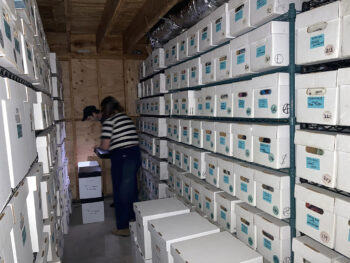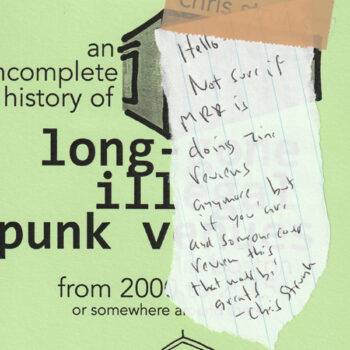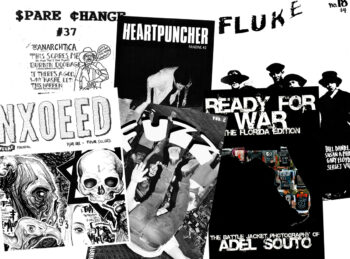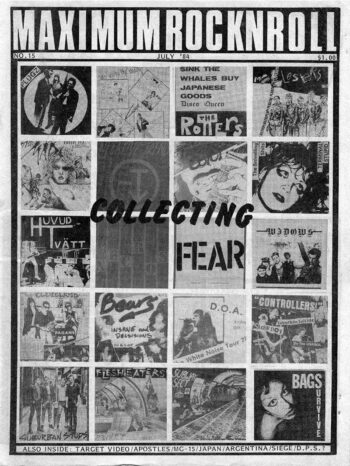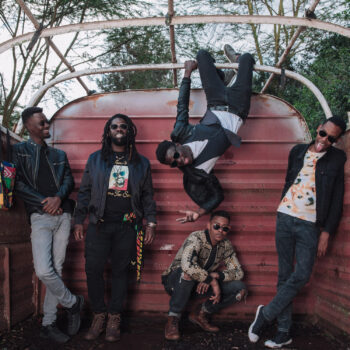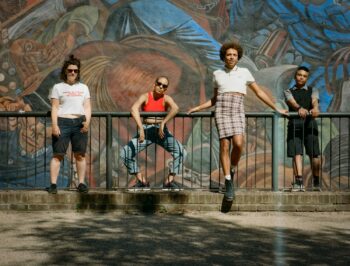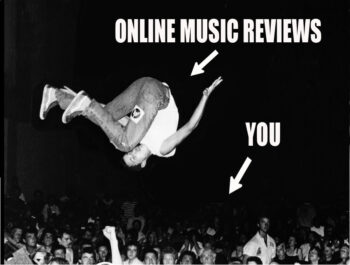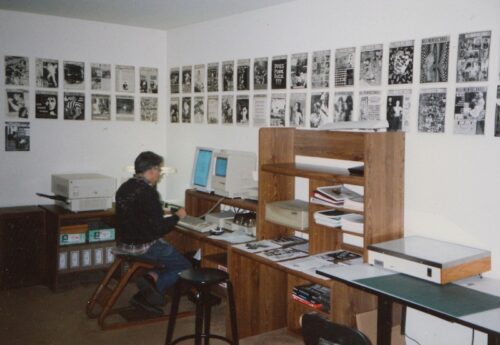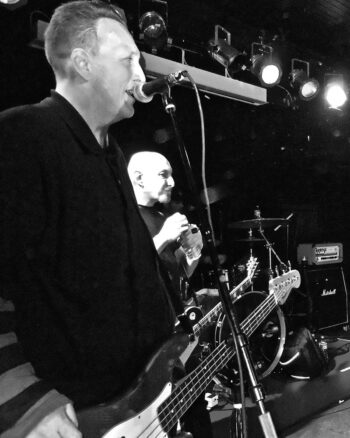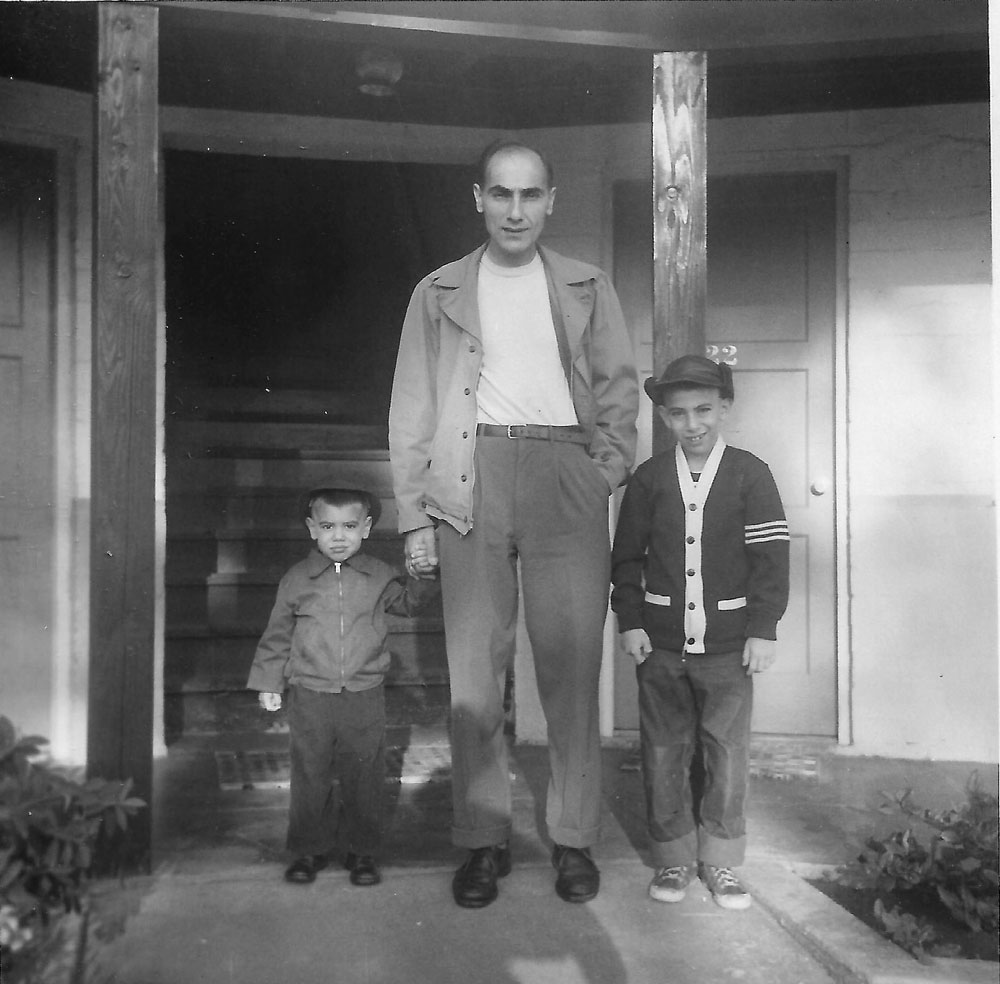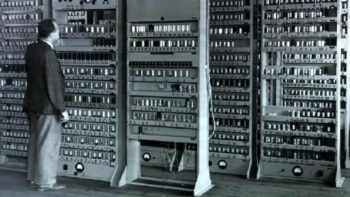Blast From the Past: Cock Sparrer
This originally ran in MRR #329 theOct/Fall ’10 issue, which is out of print
For those of you who have been long-time readers of Maximum Rocknroll, you may remember the cover of issue #204 which featured the seminal English punk band Cock SParrer. Well it’s been ten years since that issue and interview by the iconic Bruce Roehrs and it was his intention to catch the band play their first live shows in their hometown of London, England in eighteen years this past March and to conduct a follow-up interview at that time. Unfortunately as most of you know, Bruce never made it to that gig and went to the big punk-rock show in the sky… In his honor, we decided to carry out his mission to update all you readers of MRR and fans of Cock SParrer by taking the time to interview the band in the most passionate and Roehrs-like way that we could think of. We hope you enjoy this and whether you ever had a chance to meet Bruce or not, hopefully you will take the time to remember him and his contributions to MRR and the music scene in general as well!
Interview by Mike Josephson and Eric Mueller.
Photos by Jerry, Sam and James.
MRR: On the topic of Bruce, and the fact that we always seem to be having these conversations over a pint… Who is the best drinker in band? And of course, to follow that, who is the worst drinker?
Steve Bruce: Being a bible reading, teetotaler myself I wouldn’t want to cast aspersions. It just a shame the rest of the band have this chronic drink problem. Unfortunately, it is the cross I have to bear.
Colin McFaull: Mickey always has the best selection of booze. Anytime you go to his house you can guarantee that he’ll have a dozen different bottles of malt whiskey to choose from. Daryl doesn’t drink much, but I think Will is the worst drinker. After a couple of pints and he gets all loved up and starts telling me how I’m his best mate and how he’s looking after me, etc… etc… Tart.
Mickey Beaufoy: I am the best drinker in the band, as I have the most practice. The boys have always said that I am the same after fifteen pints as I am after two, I just get onto a plateau and stay there. I have also passed about fifteen police breathalyzers in my early twenties after at least six pints of beer, so I must have a lucky metabolism. Close call for the worst drinker, but I would probably have to vote for Will as he doesn’t always know when to stop—we’ve all had to put him to bed a few times over the years—and then there was the incident when he left his passport, wallet and everything else in the middle of the street outside a bar in Spain and I ended up searching half the bars at three in the morning until I found them for him—meanwhile he was safely tucked up in bed…
Steve Burgess: It depends what you mean by “best drinker.” We all like a tipple and the great thing about being such close friends is that, whenever we’re together and one of us gets embarrassingly drunk, there’s no problem. We know that, at a different time, that would be me. We also have our own favorite drinks, mine being a good single malt scotch whiskey. On tour once, I ordered a large glass of the most expensive one at the bar and was looking forward to sipping it gradually. Stupidly, I said to Will Murray (our road manager), “you should get into this, smell that” and offered him the glass to smell the aroma. It took the bastard less than a second to down it and the look on my face is still remembered by the rest of the band.
Daryl Smith: In fairness, the whole band can drink pretty well. Seasoned pros! Especially the top shelf. Personally when the Jack Daniels and the Brandy’s come out, I stick to the beers. I would say that if the best drinker is measured by the last man standing, then it has to be me as the others will eventually go to bed. I’m happy to stay up all night, Berlin ’09, London ’10, etc… If it’s about hard liquor then everyone else. If it’s about who is the best drinker of other peoples’ drink then it has to be Will! Worst drinker is probably the band member who wants to fight everyone when drunk—no names mentioned!

MRR: What is your drink of choice? …And your favorite meal?
Daryl Smith: Diet Pepsi and a Canadian Cheddar Cheese Sandwich [Laughter and Applause]
Steve Bruce: Pint of Lager and a Curry. Luuuverly.
Steve Burgess: Large single malt scotch whisky with baked beans on toast. Try it—they really compliment each other.
Colin McFaull: Jack and Coke and I should go all proper cockney and say pie and mash, but it’s probably anything with either fish and/or seafood.
Mickey Beaufoy: I can’t think of one I don’t like—Real Ale, Rioja, Scotch, Sake and VSOP Brandy all have their merits. I also have a wide-ranging palate for food—anything from steak and kidney pud to curry to sushi.
MRR: Alright… now lets jump in to the real Sunday roast! What are your three favorite shows that you’ve played in SParrer?
Steve Bruce: The one I’m playing next, the one after and the one after that.
Colin McFaull: This is an almost impossible question to answer. Would it be The Astoria in London in 1992, the “reunion show,” when we expected about ten people to show up and there was over 2000 there? Maybe the first Holidays in the Sun in Morecambe, England when we got our first chance to headline a festival? It could be the first date of the European tour in 1994 in Monchengladbach, Germany. Why would the Germans be interested in Cock SParrer? Or maybe the recent shows in San Francisco or London? It would be wrong though to forget the fantastic welcomes we’ve recently been given in Serbia, Norway, Italy, Sweden, Chicago, Denmark, Texas, Austria amongst others. So sorry, but I can’t pick out the three best shows.
Mickey Beaufoy: So difficult to answer—there have been so many. There is also the opposing merits of big “professional” shows versus the boiling hot intimate gigs, so I really can’t decide, but London 2010, San Francisco, Chicago and Berlin in 2009 and CBGBs in 2000 are amongst the contenders.
Daryl Smith: Astoria—London 1992, the entire 1994 tour and all the others.
Steve Burgess: You can’t say any show is better than another. We want to give everybody that comes a good time. How can I discount a show that, maybe, someone travelled miles to get to and thought it was great? It’s not about my favorites, it’s about theirs.

MRR: What is the worst show you’ve played, and why?
Steve Bruce: The one that comes to mind was back in the ’70s. Driving all the way to Liverpool in the snow, playing to about five people. Driving all the way back. We got paid £5.
Colin McFaull: There have been too many of these as well. [Laughter] It would have to be one of the early ones where we’d be supporting, with no one there and those that were there not interested in anything we had to say.
Mickey Beaufoy: Can’t think of one that I haven’t loved since we’ve been back on the road. However, when we played Vienna the first time in 1994, I had a temperature of 103—so it was tough to even get on stage—but the crowd pulled me through.
Daryl Smith: Can’t think of a bad show. I enjoy them all. It would probably be one where the sound was bad on stage as that can be frustrating… But as hard as it is sometimes from a musician’s point of view, you have to overcome your own frustrations as the most important people are the fans. We’ve done gigs, where on a personal note, individuals may feel they have had a nightmare, but the rest of the band will quickly put it in perspective by pointing out that the crowd had a great time. I don’t think there’s been a gig in my time, since 1992, where the response from the crowd has been anything other than fantastic. We’re very fortunate and very appreciative—Cock SParrer has the best punters.

MRR: In regards to the recent shows in London, how come it had been so many years, eighteen I believe, since you had last played your “home town?” Was it a choice by the band for some reason? Or had there been some negative history there in London from the past that prevented it?
Colin McFaull: No, not really. I think we always knew that we’d play London again one day, we just never got round to organizing anything. When we were only doing one or two gigs a year, it was easier just to go and do the big Rebellion type festivals. It was only when we got to the stage where we were playing a lot more and people said to us “It’s all very well playing New York, but what about London?” that we knew we had to do something about it.
Daryl Smith: Bit of both really. The band stopped gigging not long after trouble at the Fulham Greyhound in London back in 1983. The reunion gig nine years later at the Astoria went really well, but after we finished playing there was trouble. So it seemed that a decade hadn’t changed the behavior of the London crowds. We then found out about our popularity abroad. These fans had bought the records, knew every word to every song and deserved to see the band. So we spent most of the 1990s playing in Germany and the rest of mainland Europe. Even the USA got to see us on both coasts before we would play England again. It was a choice to play in front of people who appreciated us, and also a choice to avoid crowds who wanted trouble. No one deserves to get hurt at a SParrer concert. We feel a sense of responsibility to the fans. Thankfully, the punk and skinhead scene in the UK is very healthy now and we felt it was time to play “back home” in London.

MRR: In relation to the reputation as “hooligans” in the early days, were you guys all actively supporting football clubs? If so, who supports which clubs? And have you been avid England supporters over the years?
Colin McFaull: I first went over The Boleyn ground when I was seven years old. You had to take a milk crate with you then to stand on to see the game! I’ve been a West Ham fan ever since. It’s all about where you come from. I’ve made sure that my kids have also been introduced to the trials and tribulations of being a West Ham fan from an early age as well. You got to learn to take the rough with the smooth, the downs as well as the ups, there’s just a load more downs being a Hammer. Me, Will and Burge have always been West Ham fans and still get over there. Steve is a Millwall fan, but we don’t talk about him, Mickey’s always supported Arsenal, glory hunter! Daryl supports Watford, who? Exactly! Of course I support England as well, but it has to be West Ham first and then England.
 Mickey Beaufoy: I think it has escaped that I have supported Arsenal since I was six. They were the first team that I went to see and they won, so I had a tough upbringing in the East End of London, but I do have a soft spot for West Ham, just because the rest of the band and my Dad supported them.
Mickey Beaufoy: I think it has escaped that I have supported Arsenal since I was six. They were the first team that I went to see and they won, so I had a tough upbringing in the East End of London, but I do have a soft spot for West Ham, just because the rest of the band and my Dad supported them.
Daryl Smith: I support Watford. Made famous only by the two Johns… Elton John and the legendary Watford Jon of Argy Bargy, so famous that SParrer wrote a song named after his band! Not the biggest club and certainly not a hooligan club. Has always had a reputation for being family friendly. Watford is a tough town though with some top boys, but due to the proximity to London, most of them support a London club and run with those hooligans. We had our share of trouble though. Jon and I avoided arrest after one incident as I told the arresting officer that I played classical piano!
MRR: Today’s times have changed, and people have grown up… to you, what is the role of today’s hooligan / skinhead?
Steve Bruce: If you don’t know your role as a hooligan or a skinhead, you shouldn’t be a hooligan or a skinhead!
Colin McFaull: It’s a culture that I wouldn’t want to see lost, there’s too much heritage in terms of music and fashion to lose should it disappear. So it’s down to skins young and old to keep it going, that’s their responsibility. But from what I’m seeing at gigs in terms of all the young skins turning up there’s no fear of that happening.
Mickey Beaufoy: I don’t see so many hooligans around these days, but maybe that’s because I am older and not in the thick of it. Most of the role models on the scene now seem to me to be people with good common sense and more likely to break up a fight than start one.
Daryl Smith: You can be a skinhead without being a hooligan. You have to remember that hooligans were a product of a particular social era and point in time. Being a hooligan now and following that way of life is out of touch and dated. Skinheads are proud people and it was always about making something of yourself, bettering your position through hard work and taking no shit from anyone. You don’t have to wear boots and braces for that either. It’s a state of mind and it’s in your heart.
MRR: How do you feel about people who attempt to rally behind your songs to support racism / fascism?
Steve Bruce: Get a life.
Mickey Beaufoy: The same way that I feel about left wing extremists doing the same thing—both extremes are as bad as the other. I prefer the sentiments of “Right Wing, Left Wing full of hate—we don’t want to fight”.
Daryl Smith: The same way as I’d feel if anyone tried to use our songs for any form of extremism, left or right—you just don’t get it.

MRR: Citing the references you do, and coming from pre-punk musical influences, what does the word “punk” mean to you?
Steve Bruce: Not conforming, not being what people expect, being true to yourself.
Mickey Beaufoy: To me, punk has always meant being a bit rebellious—remaining true to your roots and having your say.
Colin McFaull: Punk just really shook things up for a while. The music industry and the music press in 1976 were run by big corporates pretending, in some cases, to be independent. They were focused on the bottom line in the same way that most businesses have been run since the advent of capitalism and still are today. Punk, very briefly, threw away the rulebook and tried to circumnavigate the norm. All of a sudden you had bands that couldn’t play, playing to audiences that didn’t care. People were writing fanzines and reviewing shows that were being printed in their front rooms. Independent record labels were sprouting up everywhere and we began to see a rise in the number of alternative comedians. For a short while it was exciting and fresh, but then it began to eat itself and implode. In just the same way that the previous, populous music scenes had relied upon a “safe” formula to succeed, so punk fell into the same pitfalls: less “street,” more “Kings Road.” The forming of Oi was probably the best thing to ever happen to Cock SParrer. We were never going to wear bondage trousers and go to art school.
MRR: Most fans are familiar with Cock SParrer the “punk” band. Can you tell us more about your favorite memories of the early years, working the pub circuit with the likes of the Small Faces, etc…
Colin McFaull: From ’72 to ’76 we just grabbed as many gigs as we could, tried not to be evicted from too many apartments, tried to eat something at least every other day and knew exactly how many shifts we would have to work to stay pissed for the whole weekend! Loads of bands that we played with were really great blokes and some were complete arseholes. It was all about learning for us. Watching all these great bands, listening to their songs, seeing how they interact with the audience and then nicking everything!
Mickey Beaufoy: Yeah, we played with loads of bands—mostly after horrendous trips cramped in the back of a GPO van with all our gear, but once in complete luxury when we supported the Small Faces for two whole weeks. Setting up your gear in the corner of a pub behind a post one night and then playing to a thousand on a proper stage supporting someone at the weekend—just for expenses and a few beers—we paid our dues.
MRR: In reading Steve’s new book, Best Seat In the House, it was very interesting to see a lot of the old newspaper clippings, and it appears from those that you guys have had to shake a bit of a bad image as hooligans or right-winger/nationalists from the get-go. Obviously that must have been frustrating, but was it ever enough to make you want to quit? Or did it make you more determined to persevere and prove yourselves to the press and the public?
Steve Bruce: I don’t think I ever wanted to quit. But it got to a situation a couple of times that we couldn’t progress and had to take an enforced break.
Colin McFaull: We had a few gigs that got wrecked back in the day and because it was a Cock SParrer show people either thought that it was our fault it happened or that we were complicit in it. It got to such a stage where we honestly thought that someone was going to get seriously hurt. We decided to knock it on the head for a while because we didn’t want one of us, or a fan, getting killed.
Mickey Beaufoy: Personally, I think that the press coverage that we were receiving in the early ’80s was pivotal in my deciding not to go on the road to promote Shock Troops, as it was like trying to swim upstream and I couldn’t see us making a living out of music. I had already given up two years of my life trying to make it happen and I needed to make some money. As it turned out I only missed about four gigs and was back playing with the boys within a year of so.
MRR: What is the one decision being part of this band that you are most proud of? …And what one decision are least proud of?
Steve Bruce: Most proud of never ceasing to believe in Cock SParrer, and making us play again… At the same time, risking losing my best mates by driving them mad, to make Cock SParrer play again.
Colin McFaull: I think I’m particularly proud of the way that we’ve never compromised on any decision we’ve ever taken. We have never consciously shortchanged anyone, either fan or promoter. We made a decision that if we were going to do this, we would do it properly. The worst decision that we ever made was to leave Mickey’s photo off the sleeve of Shock Troops when he played on every track.

MRR: Thirty or more years ago, did you think you would still be playing as CockSParrer in 2010 and beyond!?
Steve Burgess: Yes.
Steve Bruce: No, but I’ll go on till I drop.
Colin McFaull: Definitely not. This is a young man’s game ain’t it?
Mickey Beaufoy: I could never imagine not playing music with the band—even in the quiet years, I regularly played with Steve and Steve in a covers band in Bethnal Green. What I didn’t expect was to be playing shows all over the world to packed venues—it’s unbelievably brilliant.
MRR: Now that we’re closing in on 2011, and SParrer’s 40th year together as a band, what do you hope Cock SParrer means to the world in another 40 years?
Steve Burgess: I think anyone who reads Steve’s book would realize that the dream of forming a band at school and still being together forty years later can happen. It may be that you originally got into it to become mega-rich pop stars, but sometimes you get something just as good out of it without topping the charts, maybe something better.
Steve Bruce: I’m just glad we have left a mark, or more probably a scar, on the music business. I’m extremely proud of our achievements and I wouldn’t change a thing. We exist outside the mainstream music industry and that’s the way I like it.
Colin McFaull: I hope that our legacy is just that a couple of our songs are remembered and maybe covered by others so that people recognize that we could knock out a tune or two.
MRR: Mission accomplished already I think Col!
Mickey Beaufoy: Who knows… It always amazes me just how popular the band has become, so I would hope that people would continue to enjoy our anthemic music and that they recognize us as a group of loyal mates who found a way to share our passion with likeminded people.
Daryl Smith: Hopefully I’ll be the only one left and I can cash in on all the secret recordings I’ve done that they know fuck all about…

MRR: You’ve been coined “the best punk band that you haven’t heard of?” How do you feel about that?
Steve Bruce: I think it was me that said it. So I like it.
Colin McFaull: I really like that. I’ve spoken to so many people who think that they are members of some small, exclusive club cos they like Cock SParrer. We were in a bar at an airport the other day, no surprise there, and some bloke asked the name of the band. When we told him he just looked at us blankly and said “never heard of ya.” He was more disappointed than we were.
Steve Burgess: To be honest, [that line] annoys me a bit. We play all over the world and we sell out venues and hopefully give everyone a good night out. And that’s because they like the songs and we work hard to try to give a good show. The mainstream British press tend to ignore us, but I think Colin summed it up when we were headlining the Blackpool punk festival and he said we were at the most incredible private party there’s ever been and if others don’t want to know, then fuck em.
Mickey Beaufoy: I wouldn’t change a thing. If we had made it big when we had the chance, would it have changed us? Would we still be mates? Would we all still be alive? Nope. Not willing to risk changing my life from where I am now.
MRR: What are you most looking forward to in the future of SParrer? What’s left to cross of the list?
Steve Bruce: It’s big world out there and people still want SParrer. We are always looking to play where we haven’t been before. Personally, I just want to keep gigging.
Colin McFaull: False teeth and hip replacements.
Mickey Beaufoy: I would love to repeat the London experience again some time soon, but I would also like to do some gigs on the west side of the States and Canada as I love that area—maybe Seattle and Vancouver. I also have a yen (sic) to play in Japan as I hear we have a good fan-base over there.
Daryl Smith: Another album. Going to Japan, going to Australia. That’s the real beauty of being in a band. Getting to see parts of the world that you’d never get to otherwise and meeting people from all backgrounds and all walks of life that have been brought together by music.
MRR: What is the song “Spirit of ’76″ about?
Steve Bruce: Drinking gin in 1976.
Colin McFaull: I’ll let Burge answer that.
Mickey Beaufoy: I think I’ll let Burge answer that one.
Steve Burgess: In England in 1976 we had a musical revolution, which gave rise to punk rock. Most Americans probably think that English punk started in 1977, but it was actually in late 1976 when the Sex Pistols released “Anarchy In The UK.” From then on, as Steve Bruce writes in his book, we, and many like us who didn’t fit into the prevailing musical genres of the day, became punk rockers. Nobody liked us, we didn’t care. “Spirit of ’76″ is about those heady times. Technically, the song is written in the present tense to give it an urgency, a sense of being there as we were, instead of it being a trip down memory lane. It also needed someone to be a focal point, so it wasn’t just a description of the scene, but made you understand what it was like the first time you saw a punk rock concert. I was hoping it would only emerge who that was after you’d listened to the song a few times.
It can probably be seen as a “prequel” to “Where are They Now.” It hopefully evokes all that was best about those days before the disillusionment set in. After ’76 / ’77, we realized a lot of the bands who joined the punk bandwagon were only using it to get noticed and soon reverted to their true colors, soul, mainstream rock, etc… We took it all a bit more literally which was why in the eighties, when we were finally given free rein to record the music we wanted, we made a 1977 punk rock album called Shock Troops.
MRR: As all of his readers knew, Bruce (Roehrs) was heavily focused on lyrics when determining whether or not he liked a band. He loved SParrer; a true testament to your lyrics… but what is your favorite SParrer lyric?
Steve Bruce: The lyrics to “Because You’re Young.” It still makes the hairs on the back of my neck stand up sometimes when we play it.
Colin McFaull: “Things get worse with every hour. The future fades into the past. All they want is total power, climbing on the backs of the working class.” [from “Riot Squad”]
Mickey Beaufoy: It’s not my favorite SParrer song, but the line from “Secret Army,” “when a mother cries for the son she had, that’s when the world’s gone mad” always makes the hairs on the back of my neck stand up. However, I like “Out on an Island” as a complete lyric and “Lies” is a typically clever lyric from Burge.
MRR: On that note, “What’s it like to be old?”
Steve Burgess: Better than being dead.
Mickey Beaufoy: Ask me in twenty year’s time. As long as I play music I don’t feel old—I’m still stage diving at 55.
Colin McFaull: I dunno, ask Steve Bruce.
Daryl Smith: You’d have to ask Mr. Bruce
Steve Bruce: It’s OK as long as you have had and have a life.
MRR: What are your comments on Steve’s book…
Steve Bruce: It’s the work of a genius.
Colin McFaull: It’s full of lies and untruths, don’t believe a word. Seriously, it’s great that he’s managed to capture all of the old memorabilia in one place and I’m really pleased it has been well received. I know Steve had a few sleepless nights over it. The best thing though is that it has reminded me of loads of stuff and stories that I’d forgotten. Must be an age thing!
Daryl Smith: Fantastic—to have all that memorabilia is a collector’s and fan’s dream. I’ve obviously heard the stories a thousand times, and that’s no bad thing, so it really was the extra’s that made it for me. Seeing all the original ticket stubs and flyers—great stuff. Just don’t believe anything you read in there as far as facts go! As he says at the beginning, it’s how he remembers it… and he is the oldest member of the band so we’ve let him off!
Mickey Beaufoy: I am glad that he wrote it—as it answers a lot of people’s questions and is a great repository for all the cuttings and material that he has accumulated over the years. I just hope his old English teacher doesn’t read it, he might cancel his English exam results.
Steve Burgess: I’ve always wanted to write a book, he actually did it.

MRR: Through the narratives in Steve’s book, it’s clear that CockSParrer is more than just a band, but truly a family more importantly. The way your wives, children and lifelong friends fill up your guest lists, and the massive parties that ensue after the gigs all across the world makes it very clear that you not only have a very strong family as a band, but a very strong extended road family as well. Ourselves, the Pirates Press Crew, Bruce Roehrs and many of our other friends have been welcomed by you all on many of these occasions, and while we hear (and participate in) lots of stories about partying all across the globe, perhaps one of the most vivid set of stories is about all the costume parties that the Bruce’s have hosted over the years… what have been the best costumes at one of these legendary Bruce family gatherings…
Steve Bruce: I once dressed as a giant rabbit. Standing outside my house I almost caused a car crash. I bet the driver has never taken a drink since.
Colin McFaull: I’m convinced that he only has these parties now to wind me up, he knows how much I hate them. It must be worse for Daryl, you can only dress up as Homer Simpson so many times!
Daryl Smith: Yes, I’ve gone as Homer Simpson—just an excuse to stuff my face with donuts and drink beer all night. I won a trophy, second prize, for my Frankenstein outfit once. Didn’t take a change of clothes and freaked out the staff in the gas station when I walked in at 2am on the way home. But it’s got to be the Smurfs that wins the best idea ever!
Colin McFaull: Definitely, the best one was probably when all of us, wives, kids, about 20 of us in total, dressed up as Smurfs. Blue paint, little white hats the lot. Burge was Papa Smurf, well punk rock that night was. I’m still getting blue paint off the walls of my house.
Mickey Beaufoy: Every room you went into had at least four or five blue skinned people in it, talking to other outrageously dressed characters. The Bruces’ know how to throw a party.
MRR: Who has been the most influential person in your life?
Steve Bruce: My father.
Colin McFaull: My mother followed closely by Wendy, my wife
Mickey Beaufoy: I would have to say my Granddad in my early life—he taught me to stand up for myself and also gave me my love of nature.
Daryl Smith: Musically, it would be Mike Barson the keyboard player from Madness, lyrically it would be Burge, attitude wise probably John Lydon from the early days, but my Granddad was probably the one who encouraged me to think for myself so he’s to blame for me being an argumentative fucker who’s always right!
Steve Burgess: Got to be more than one. Parents, obviously. This is gonna sound such a cliché, but I’ve been inspired by the rest of the band, then later my wife and kids and also the other band member’s wives and kids.
MRR: Final question, for all the diehard MRR readers who remember your adorning the cover some ten years ago… Our close friend Bruce was meant to conduct this interview with you guys for MRR, however, as you and many of the readers know, he unfortunately passed away unexpectedly. Do you have any specific serious or funny memories of Bruce from his interview ten years ago or any subsequent meetings since that you’d like to share with his loyal readers and the MRR family?
Steve Bruce: I think Bruce was one of the nicest, thoughtful, intelligent men I have met. You knew there was no hidden agenda when he interviewed you and his questions were of genuine interest and from the heart. Not just to sell magazines. He was a good guy and I miss him.
Colin McFaull: I just knew within five minutes of sitting down to do that interview with Bruce for MRR in some diner in San Francisco that this guy was a serious player. He knew more about my band than I did, but still held no preconceptions about us that clouded his viewpoint. It was a very pleasant way to spend a couple of hours without being asked why the P in SParrer is in caps.
The next time I saw him was in San Antonio last year. Halfway through a song I turned to Daryl and shouted “that bloke down the front don’t half look like Bruce Roehrs” Daryl replied “nothing like him.” A few months later we caught up with Bruce backstage at the Pirates Press Anniversary gigs in San Francisco and told him that we’d seen his doppelganger in Texas, but knew it couldn’t have been him because he never came back after the show and drank us dry. He just laughed and explained that it was him, but he didn’t want to impose … and then continued to drink us dry.
Mickey Beaufoy: I remember Bruce with great affection—not only was he one of the most knowledgeable people to talk to about music but he was also a keen Ornithologist, like me, and that is a rare person to meet on the punk scene… I never knew what we were going to cover when we started talking—but usually it was a bit of both. Bruce was a brilliant bloke…
Daryl Smith: I remember Bruce as a larger than life character and the outpourings of condolences after his passing certainly backed this up. His famous bear hug and insatiable appetite for music touched everyone. However, in San Francisco last November I sat on the edge of the stage after everyone had gone and the PA was being cleared away with the empty plastic glasses being swept up and had a long chat in a quiet moment with him. He was thoughtful, honest and really perceptive of the people we were chatting about. I feel privileged to have spent some quality time away from the craziness with him.



